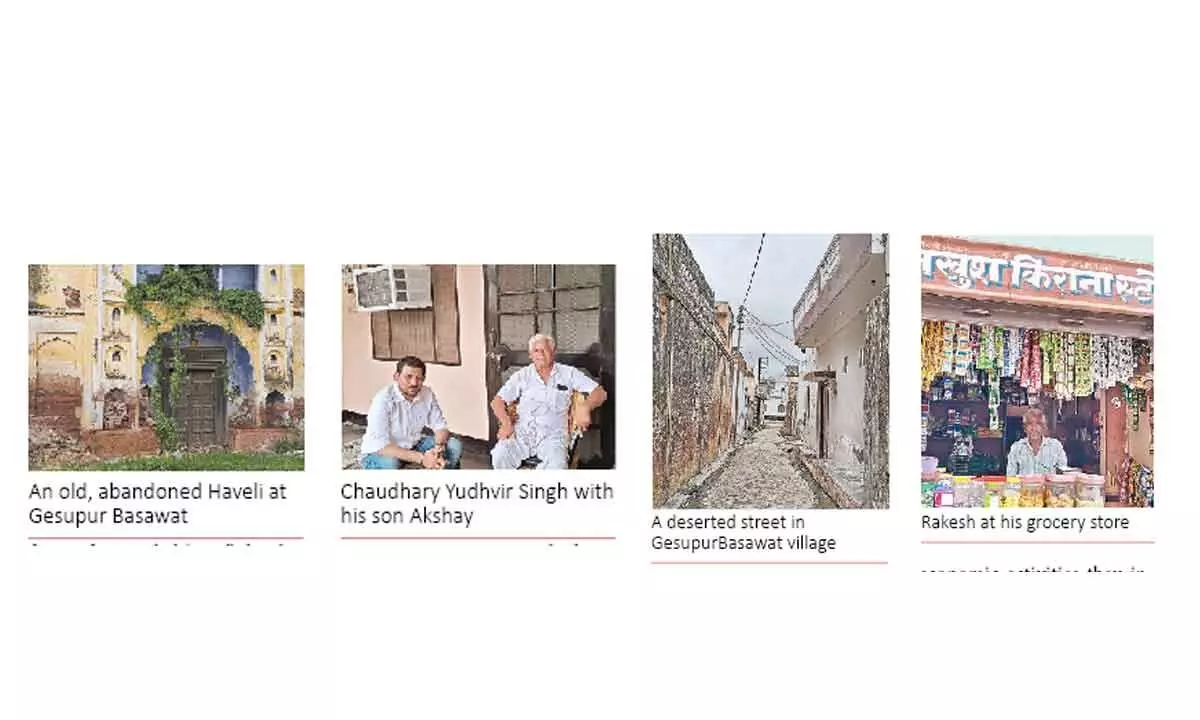Farming languishes, but villages thrive in UP’s Meerut
Visible pick up in money spend due to infra-led economic activity; Sales of grocers, milk vendors on the rise; However, agri labour cost, labour shortage increasing
image for illustrative purpose

Politicians keep boasting about the great measures they have taken to help farmers. Bizz Buzz visited the countryside in the Meerut district to verify politicians’ claims and farmers’ expectations from Budget 2024-25
Meerut (Uttar Pradesh): Chaudhary Yudhvir Singh is a contented man. After serving in the Border Security Force (BSF), he is living a retired life at his native Gesupur Basawat, a small village in the Meerut district. Sitting in the courtyard of his home, which is bigger than most houses in the village, he reminisces, “things have improved here, but I don’t know how.”
Appears paradoxical, but the statement pretty much sums up the rural scenario in this region, perhaps also in the entire north India. There has been an improvement in living standards - and not just of the gentry like Singh, who owns land.
Inflation, for instance, is a general concern, but this has not resulted in any dip in the sales of shopkeepers in villages. Sunil Pal, who has been running a grocery store for two-three years, says that there has been an increase in sales.
Rakesh, another grocer for 10-11 years, corroborates this. Further, Rakesh says there has been no negative impact of the spurt in e-commerce. “They sell their goods, we sell ours,” he adds.
Raj Kumar, who runs a dairy from his household, is able to sell milk at a much higher price today than a couple of years earlier, but complains about the shortage of labour. Free ration given by the central government to the poor has resulted in this shortage; it has also jacked up labour cost.
Life for laborers, however, is not exactly idyllic. Sonu, an e-rickshaw driver who also does odd jobs when available, laments about the hardships he is facing in life. “Only I know how I pay the fees of my children,” he laments, adding that he is determined to give them a good education.
A good development in the last few years has been betterment in the law and order situation. Akshay, Chaudhary Yudhvir Singh’s son, says: “Earlier, petty thefts were common. Even the transformer equipment was stolen. There has been a marked decline in such cases.”
While this will be seen as a feather in Chief Minister Yogi Adityanath’s cap, his government’s hard stance on cow protection has cost farmers dear. Stray cattle, which damage crops, have become the bane of farmers. Worse, stray cattle have become very strong, laments a farmer from the nearby Sivay village. “It is no longer easy to drive them away.”
Farmers’ woes are far more than the depredations of wandering cows and buffaloes. Ch. Balraj Singh, a veteran of rural cooperative banking who lives at the nearby village Daurala, says that agriculture is not remunerative, as input costs are rising which are not commensurate with earnings.
He and other farmers are contemptuous towards the Pradhan Mantri KisanSamman Nidhi (PM-KISAN), the welfare scheme that allows the transfer of Rs4,000 thrice a year in the accounts of farmers. This turns out to be Rs500 per month. How can it help any family, they ask, adding that it is not ‘SammanNidhi’ but ‘apmannidhi.’ They want it to be Rs3,000-5,000 per month.
Talking about general prosperity that the region has witnessed in the recent past, the agriculturists say that this is because of other economic activities they indulge in. “Those who solely depend on agriculture are struggling hard,” says Sachin Pal Ahlawat, whose native place is Daurala.
Farmers want the government to do more for them in the Budget. They would welcome measures that augment their income. Most of these problems, however, relate to off-Budget issues, one of them being environmental degradation.
Water pollution is a big concern in this area. Quite apart from the lack of facilities like sewage and effluent treatment plants, there is the issue of reverse boring. Whereas boring helps lift underground water to the surface, reverse boring disposes of polluted water into the ground by drilling a deep hole. When the contaminated water mixes with ground water, it adds toxicity to aquifers, resulting in health hazards when it is pumped out for drinking and other purposes.
What is more worrying is that now it is not just big factories that are injecting their water into the ground; even housing societies, restaurants, etc., are doing the same.
The situation is worsening, but the administration is doing nothing about it, the locals say. In this regard, GesupurBasawat and other villages on and near the Delhi-Meerut Road are similar to other parts of India: whatever good has happened here is because of the enterprise of people, and most of the bad things are the result of the inadequacies on the part of government and local administration.

